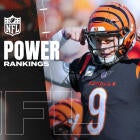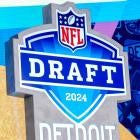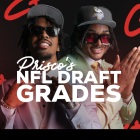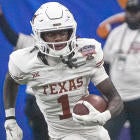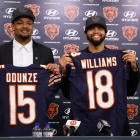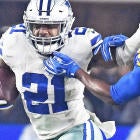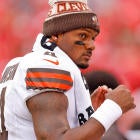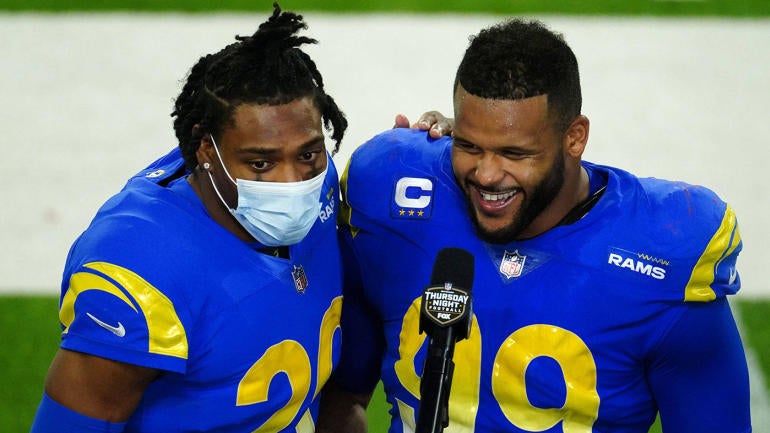
Creating the ultimate 53-man roster is pretty simple when there aren't any parameters. It's a more challenging exercise when operating under a salary cap. Roster construction becomes more complicated with other restrictions designed to prevent a squad from resembling last season's All-Pro team. The constraints bring more realism to selection process. The ground rules are as follows.
Parameters
1. The salary cap for the roster is $193.7 million although the actual NFL salary cap is $182.5 million for this year. The number being used is the league's average adjusted salary cap, according to NFLPA data. Each NFL team's working salary cap varies largely because unused cap room can be carried over from one year to the next. For example, the Browns have the NFL's highest adjusted salary cap at $211.9 million largely thanks to carrying over a little less than $30.4 million of cap room, which is the most in the league. The Super Bowl LV champion Buccaneers have the lowest at $182.05 million, which is about $450,000 below the league-wide number. Situations like this typically occur when incentives earned during the previous season that weren't counted on the cap get accounted for without sufficient cap room carrying over from the prior year to make up the difference.
2. The NFL Draft is an essential element of roster building for NFL teams. It is here also. One player from each round of the 2021 draft must be on the roster. The number requirement drops by one player for each year of the preceding three drafts (2018-2020). The limit of one player per round remains. Thus, only four 2018 draft picks are required. There's one other draft pick constraint. Only one 2017 first-round pick whose fifth-year option was exercised is allowed regardless of whether he signed a contract extension. The 2017 first round is particularly strong with All-Pros Myles Garrett, Marlon Humphrey, Patrick Mahomes, Christian McCaffrey, T.J. Watt and Tre'Davious White. The limitation forces a choice to be made between them.
3. The backups at each position are limited to players that aren't established starters, were reserves in 2020 or lost a starting job this year. This means young veterans cracking the lineup for the first time are eligible as reserves. Those starting last season only because of an injury are also fair game as backups. Players competing for starting jobs in the preseason or where there's a "by committee approach" at a position, usually running back, are also acceptable. A backfield containing Dalvin Cook and Derrick Henry is prohibited since both are workhorse or every-down running backs.
4. Choosing a player that was given a franchise or transition designation in 2021 is optional. However, only one player receiving a 2021 designation can be selected.
Roster building philosophy
The salary cap dropping from $198.2 million in 2020 to $182.5 million this year reduced the adjusted salary cap by $17.15 million. The decrease had a major impact on the selection process.
All players with cap numbers over $15 million were eliminated from consideration since cap space was at more of a premium than last year. Davante Adams ($16.793 million), Joey Bosa ($20,754,950), Derrick Henry ($13,503,025), Xavien Howard ($15,210,294), Aaron Rodgers ($27,573,568) and Bobby Wagner ($17,158,525) are all luxuries I can't afford. A concerted effort was also made to keep cap numbers under $10 million. There are only two selections with cap numbers above $10 million.
Selecting an elite quarterback was the top priority since the NFL is a passer-driven league. A cap friendly potential franchise quarterback is the most valuable commodity in the NFL. This is because of the roster flexibility provided by the low cap number. Choosing one was a necessity.
An emphasis was also placed on the offensive and defensive lines. The football adage of "it starts in the trenches" was a guiding principle in assembling the roster. There are three starting cornerbacks instead of a traditional base defense (either 3-4 or 4-3) since five or more defensive backs are now used more than 60% percent of the time in the NFL.
Long-range planning wasn't taken into account so worrying about future salary cap obligations, the amount of cap room that could be carried over, expiring contracts and drafting players that might develop into starters down the road wasn't necessary. Different choices would have been made if these aspects had been considerations.
Here's the team I assembled with some of my thoughts behind the selections. The 2021 cap number for each player is in parentheses.
Craving even more NFL coverage focusing on previews, recaps, news and analysis? Listen below and follow the Pick Six podcast for a daily dose of everything you need to follow pro football.
Offensive starters
QB: Patrick Mahomes, Chiefs ($7,433,381)
Mahomes, the youngest player to ever win both NFL MVP and Super Bowl MVP, has been the league's best passer since becoming a starter in 2018. He is the only quarterback besides Peyton Manning to ever throw for at least 50 touchdowns and 5,000 or more yards in the same season, which he did in 2018. The Chiefs converting Mahomes' $21,716,905 third day of the league year roster bonus to signing bonus, which created just under $17,375 million of cap room, solidified the choice.
RB: Dalvin Cook, Vikings ($5,113,037)
An inexpensive lead ball carrier on a rookie contract, such as the Colts' Jonathan Taylor, probably would have chosen if more cap resources had been devoted to quarterback. Cook had a career year in 2020. He was second in the NFL in rushing yards (1,557), yards from scrimmage (1,918) and rushing touchdowns (16) despite missing two games.
WR: DeAndre Hopkins, Cardinals ($12,507,150)
Hopkins thrived in his debut campaign with the Cardinals after an offseason trade from the Texans. He tied for second in the NFL in receptions (115) and was third in receiving yards (1,407) last season. Hopkins has the best hands in the business. He didn't drop a pass in 2020. Hopkins will alternate with Diggs in working out of the slot.
WR: Stefon Diggs, Bills ($6,379,779)
Diggs erased any doubts in 2020 about being a primary receiver threat after his unhappiness led to a trade from the Vikings to the Bills. He led the NFL with 127 receptions and 1,535 receiving yards.
WR: DK Metcalf, Seahawks ($1,257,891)
The 2019 second-round pick emerged as one of the NFL's most dangerous receiving threats last season. Metcalf caught 83 passes for a franchise-record 1,303 yards with 10 touchdowns
TE: Travis Kelce, Chiefs ($7,605,882)
Kelce had the finest season ever for a tight end in 2020. He set the single-season receiving yards record for a tight end with 1,416 yards. Kelce's 105 receptions are the fourth most a tight end has had in a season. His 11 touchdown catches tied for the league lead among tight ends.
LT: Trent Williams, 49ers ($8,193,697)
Williams didn't miss a beat after sitting out the 2019 season. He earned Pro Bowl honors for the eighth time in his career in 2020. The 49ers also rewarded Williams in March by making him the league's highest-paid offensive lineman at $23.01 million per year.
LG: Joe Thuney, Chiefs ($4.5 Million)
Thuney was Kansas City's top priority in revamping a beleaguered offensive line. The Chiefs made Thuney the league's highest-paid guard in free agency by giving him a five-year, $80 million contract. Thuney is extremely reliable. Since 2016, his 5,222 snaps are second in the NFL among offensive linemen. Thuney is also capable of playing center.
C: Corey Linsley, Chargers ($6,605,500)
Linsley earned All-Pro honors in 2020 after a season in which he only allowed four quarterback pressures (combined sacks, quarterback hurries and quarterback hits) and didn't have any holding penalties, according to Pro Football Focus. Because of this, the Chargers briefly made Linsley the NFL's highest-paid center on a five-year, $62.5 million deal.
RG: Wyatt Teller, Browns ($2,188,500)
The 2018 fifth round pick provides tremendous value as he is still playing under his rookie contract. Teller earned second team All-Pro honors from the Associated Press last season when he was arguably the NFL's best run blocking guard.
RT: Tristan Wirfs, Buccaneers ($3,688,188)
The 2020 13th overall pick made an easy transition to the NFL. According to PFF, Wirfs only allowed one sack in 20 games as a rookie.
Defensive starters
DE: Nick Bosa, 49ers ($9,260,734)
The expectation is Bosa will be as good as new after tearing his left ACL in San Francisco's second game last season. Bosa was named 2019's NFL Defensive Rookie of the Year. His 80 quarterback pressures, according to PFF, were tied for NFL's sixth most in 2019. Bosa added four sacks in three games during San Francisco's playoff run that ended with a loss to the Chiefs in Super Bowl LIV.
DT: Aaron Donald, Rams ($14,399,700)
Donald is unquestionably the NFL's most disruptive force from the interior of a defensive line. He easily led the NFL with 98 quarterback pressures, according to PFF, en route to his third NFL Defensive Player of the Year award.
DT: Cameron Heyward, Steelers ($7,489,775)
Heyward is a run stuffer with pass-rush ability. His 62 quarterback pressures were tied for third among NFL interior defensive linemen last season, according to PFF.
DE: Chris Jones, Chiefs ($8,541,666)
Since Kansas City is moving Jones from the interior to defensive end this season, so am I. He'll also take his fair share of snaps inside rushing the passer. Jones' 34 sacks since the start of the 2018 season are seventh most in the NFL.
LB: Fred Warner, 49ers ($3,645,072)
Warner started emerging in 2019 when he was named November's NFC Defensive Player of the Month. He had a true breakout season in 2020. Warner earned his first Pro Bowl berth and was named an All-Pro last year. Jets head coach Robert Saleh called Warner the best middle linebacker by far last season when coaching him as the 49ers defensive coordinator. Apparently, the 49ers agree with Saleh's assessment. He was rewarded in July with a five-year contract extension averaging $19 million per year.
LB: Lavonte David, Buccaneers ($3.36 Million)
Remarkably, David has never been named to the Pro Bowl on the original ballot. It's now pretty much a given that David will be snubbed annually because passing rushing outside linebackers are favored over off the ball ones in the voting process.
CB: Jalen Ramsey, Rams ($9,702,200)
Ramsey is considered a shutdown cornerback. He is the NFL's only $20 million-per-year defensive back.
CB: Jaire Alexander, Packers ($3,840,925)
Alexander locked up wide receivers in 2020. Opposing quarterbacks completed 50.7% of passes (35 of 69 attempts) when targeting Alexander for a 68.3 passer rating, according to PFF metrics. Alexander, a 2018 first-round pick, earned his first Pro Bowl berth in the process.
CB: J.C. Jackson, Patriots ($3,384,825)
Jackson's nine interceptions were second in the NFL last season. In fact, the 2018 undrafted free agent has the NFL's most interceptions over the last two seasons with 14.
FS: Jessie Bates, Bengals ($2,858,928)
The 2018 second-round pick flies under the radar nationally because he plays in Cincinnati. The Bengals are likely going to regret not signing Bates to a contract extension before Jamal Adams reset the safety market with the Seahawks.
SS: Budda Baker, Cardinals ($7,782,425)
Baker is the Swiss Army knife of the secondary because of his versatility. He has lined up practically everywhere for the Cardinals. After beginning his career as a special team standout, Baker has developed into an All-Pro-caliber safety.
Specialists
K: Justin Tucker, Ravens ($3,487,733)
P: Jake Bailey, Patriots ($929,120)
LS: Morgan Cox, Titans ($991,900)
KR: Ray-Ray McCloud, Steelers ($1,006,600)
PR: McCloud
Tucker is the most accurate kicker in NFL history connecting on 293 of 323 field goal attempts for a 90.7% conversion rate (minimum of 100 made). He also has only missed four extra points since attempts were moved back to the 15-yard line in 2015. Bailey, a 2019 fifth-round pick, had an NFL-best 45.6 yard net punting average last season. Cox was named to his fourth Pro Bowl in 2020. McCloud handles return duties. The 2018 sixth-round pick averaged 23.1 yards on kick returns (eighth in the NFL) and 10.3 yards per punt return (fourth in the NFL) last season.
Reserves
QB: Jameis Winston, Saints ($2,505,500)
Winston beat out Taysom Hill in a preseason competition to replace retired Drew Brees after spending the 2020 season with the Saints as a backup. He started 70 of the 72 games he played during his five seasons with the Buccaneers (2015-19).
RB: Kareem Hunt, Browns ($4,975,813)
RB: Damien Harris, Patriots ($1,080,334)
RB: Giovani Bernard, Buccaneers ($994,650)
RB: Alec Ingold, Raiders ($862,134)
Hunt will get the bulk of the carries in relief of Cook. Hunt won the NFL rushing title in 2017 with 1,327 yards while a member of the Chiefs as a rookie. He forms the league's best running back tandem in Cleveland with Nick Chubb. New England's confidence in Harris allowed them to trade 2018 first-round pick Sony Michel to the Rams during the preseason. Bernard will primarily see duty as a third-down back. Ingold is the lone fullback.
WR: Gabriel Davis, Bills ($963,643)
WR: Marquez Callaway, Saints ($789,108)
WR: Ray-Ray McCloud, Steelers ($1,006,600)
Davis got more playing time than expected as a rookie in 2020 because of injuries to John Brown. He's likely going to be Buffalo's fourth wide receiver because of Emmanuel Sanders' arrival. Michael Thomas starting the season on the physically unable to perform list and Sanders being an offseason cap casualty are giving Callaway a tremendous opportunity in New Orleans.
TE: Dalton Schultz, Cowboys ($2,303,514)
TE: Cole Kmet, Bears ($1,730,474)
Schultz was slated to be Dallas' blocking tight end until Blake Jarwin's ACL tear in the 2020 season opener. The 2018 fourth-round pick exceeded expectations. Schultz will be hard-pressed to duplicate his 2020 production (63 receptions for 615 yards and four touchdowns) with Jarwin returning to action. Kmet seems poised to emerge as he assumes a bigger role than Jimmy Graham in Chicago's offense.
OL: Cornelius Lucas, Washington Football Team ($1,666,580)
OL: Tyler Shatley, Jaguars ($1,212,500)
OL: Shane Lemieux, Giants ($875,035)
OL: Trey Smith, Chiefs ($694,701)
The offensive line depth is a mix of experience and youth. Lucas is the swing tackle. He lost his opportunity to start when Charles Leno was signed. Shatley has performed capably starting at guard and center in Jacksonville because of injuries. Giants head coach Joe Judge warned against reading too much into recently acquired Ben Bredeson getting the majority of the snaps at left guard in the season opener against the Broncos. Lemieux has been dealing with a partially torn patellar tendon. The Chiefs may have gotten a steal in the sixth round of this year's NFL Draft with Smith.
DE: Kerry Hyder, Seahawks ($1,958,525)
DE: Melvin Ingram, Steelers ($1.66 million)
Hyder led the 49ers with a career-high 8.5 sacks in 2020 with injuries decimating the defensive line. The 32-year-old Ingram is rotating with 2020 third-round pick Alex Highsmith on the edge opposite T.J. Watt in Pittsburgh.
DT: Justin Madubuike, Ravens ($1,109,350)
DT: Khyiris Tonga, Bears ($684,557)
Madubuike, a 2020 third-round pick, is a popular breakout candidate in his second NFL season. Tonga, a 2021 seventh-round pick, is strictly a run stuffer.
LB: K.J. Wright-Raiders ($3.255 Million)
LB: Jeremiah Owusu-Koramoah, Browns ($1,179,925)
LB: Sam Eguavoen, Dolphins ($858,800)
LB: Derrick Barnes, Lions ($858,812)
LB: Kaden Elliss, Saints ($871,626)
Free agency was a rude awakening for Wright, who had a solid 2020 season. He didn't sign until after Labor Day because he couldn't find a situation to his liking. Wright will be on the strong side when a 4-3 defense scheme is warranted. Owusu-Koramoah should emerge from Cleveland's linebacker rotation as the season progresses. Eguavoen got himself off the roster bubble in the preseason with a four-sack performance against the Falcons. Elliss and Barnes are core special teams players on this squad.
CB: Patrick Surtain II, Broncos ($3,814,928)
CB: Paulson Adebo, Saints ($919,831)
CB: Nate Hobbs, Raiders ($738,868)
Youth is being served as all three reserves are rookies. Ronald Darby going on injured reserve with a hamstring injury has opened the door for Surtain II, 2021's ninth overall pick, to get extensive playing time. Adebo, a third-round pick, is already paying dividends for the Saints. He had an interception against the Packers in the season opener. Hobbs, a fifth-round pick, was a pleasant surprise for the Raiders in the preseason.
S: Amani Hooker, Titans ($1,041,479)
S: Kamren Curl, Washington Football Team ($816,032)
Hooker tied for the Titans lead with four interceptions last season in limited action. Curl didn't play like a seventh-round pick as a rookie in 2020 after getting his opportunity because of Landon Collins tearing an Achilles.
Tale of the tape
Total salary cap room used (53 Players): $186,967,479
Remaining salary cap room: $6,732,521
Offense (25 Players): $87,524,711
Defense (25 Players): $94,034,015
Specialists (3 Players): $5,408,753
Positional salary breakdown
(Salary cap percentage in parentheses)
QB: $9,938,881 (5.13%)
RB: $13,025,968 (6.72%)
WR: $22,904,171 (11.82%)
TE: $11,639,870 (6%)
OL: $30,015,821 (15.5%)
DE: $21,420,925 (11.06%)
DT: $23,683,352 (12.23%)
LB: $14,029,241 (7.24%)
CB: $22,401,585 (11.57%)
S: $12,498,882 (6.45%)
Final thoughts
All of the cap room isn't being used. A cushion has been left for a full practice squad of 16 players (approximately $3 million) and to sign players when the inevitable injuries happen during the season.
There is a slightly bigger allocation of cap resources to defense, which should be expected with a low-cost starting quarterback. Nearly 40% of the available cap space is devoted to the offensive and defensive lines, which is consistent with the starting in the trenches philosophy.
The Chiefs lead the way with five players. The Saints have four players. The Browns, Buccaneers, 49ers, Patriots, Raiders each have three players. Six teams (Colts, Eagles, Falcons, Jets, Panthers and Texans) didn't have a player selected.













